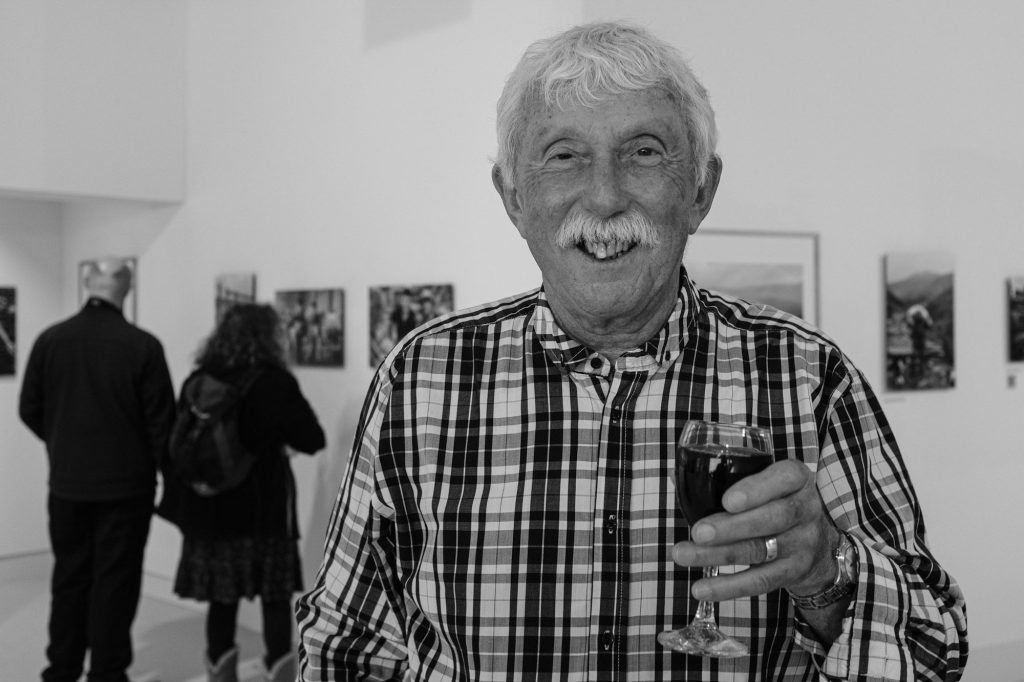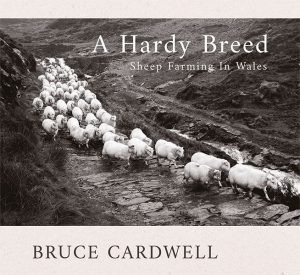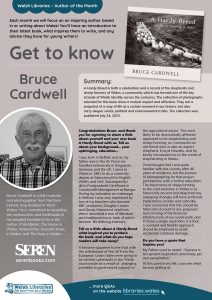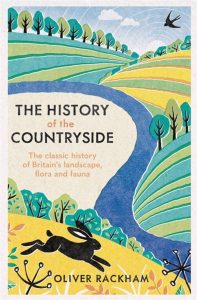Bruce Cardwell
January 1, 2024
Bruce Cardwell is a folk musician and photographer from Northern Ireland, long resident in West Wales. He is committed to recording the communities and livelihoods of his adopted homeland. He is the author of Hoofpicks: The Horse in Wales, Noteworthy: Acoustic Music in Wales, and The Harp in Wales.
Published this year, A Hardy Breed is both a celebration and a record of the shepherds and sheep farmers of Wales, a community which has formed one of the key strands of Welsh identity across the centuries.
Bruce spent some years visiting sheep-farming families across Wales. They responded to him with warmth and openness, sharing their hopes and fears as they face up to a challenging future.
The collection of photographs selected for this book show a mutual respect and affection. They are a snapshot of a way of life at a certain moment in our history, but also carry deeper social, political and environmental truths. The people in these radiant photographs are resilient. The book gives them space to speak for themselves, and Bruce elaborates on their concerns in his Introduction and Afterword. Broadcaster John Humphrys provides a Foreword, as does Will Troughton, Curator of Photography at the National Library of Wales, which purchased these images for the nation.
Congratulations Bruce, and thank you for agreeing to share a little about yourself and your new book A Hardy Breed with us. Tell us about your background… your upbringing, education…
I was born in Belfast, and as my father was in the Air Force we travelled extensively in Singapore Germany and the UK. I came to Wales in 1981 to do a university degree at Aberystwyth in English, Welsh, and Irish. Subsequently I did a Postgraduate Certificate in Countryside Management at Bangor. During my education as a teenager in Belfast I was very impressed by two of my teachers who became BBC producers, Douglas Carson and Davey Hammond, and from them I absorbed a love of literature and traditional music, both of which became life defining interests.
When did you realise you wanted to be a photographer, was there an ‘eureka moment’, and did any particular factors make a difference?
Although I had basic snapshot cameras as a child, real photography for me began during my countryside management training in 1984, when we were instructed how to use the camera as a monitoring tool for registering changes in vegetation and landscape. Only later did I realise the creative possibilities in photography, and start to try to take more ambitious images.
Another of my lifelong passions, and one that is typically Irish, is a love of horses. Having worked on a racing stud farm in Gloucestershire, training showjumpers, and also pony trekking in Greece, I became involved in creating a photographic book for Seren publishing called The Horse in Wales. It was the first of my four photographic books that Seren published, the others being Noteworthy: Acoustic Music in Wales, The Harp in Wales, and currently A Hardy Breed. The process of becoming a photographer has developed organically for me, being based on interfaces with my existing passions over a long period of time.
Tell us more about A Hardy Breed – what inspired you to produce the book, and what do you hope readers will take away?
It became apparent to me that with the withdrawal of the UK from the European Union there were going to be seismic upheavals in the Welsh countryside as a result of changing priorities in government subsidy to the agricultural sector. The most likely to be dramatically affected appeared to be shepherding and sheep farming; so I contacted an old friend who is also an expert shepherd, Erwyd Howells, and he kindly introduced me to the world of shepherding in Wales.
I had thought that I was quite familiar with the country after 40 years of residence, but the process of photographing for that project provided me with a further education. The importance of sheep farming to the rural economy in Wales is so historically ancient and deep that any sweeping changes will have profound implications socially and culturally. I was concerned that this should be taken into account in any proposed restructuring of the financial infrastructure of our countryside, and if I have a single aspiration, it is that a nuanced and flexible approach should be employed to avoid accidental collateral damage.
What are your favourite reading genres, and what book are you reading at the moment?
My taste in reading matter is eclectic, but I seem to be inclining recently more towards factual works, after a lifetime of fiction. At the moment I am trying to assimilate some of the broad erudition of Arthur Rackham’s The History of the Countryside.
In what way have libraries influenced you during your lifetime?
In my youth the local library was an amazing window into a multitude of alternative universes, but today it is having to compete with the gargantuan opponent of the ubiquitous Internet. There is something in the printed word, however, that communicates with our human brain in a way that is essentially different from the ephemeral nature of digital messaging. The printed word is subject to discipline and control in a way that much Internet content of today is not, and it is perhaps intended to be engaged with in a more considered way.
Do you have suggestions of how to encourage children and young people to read more for pleasure?
There is a magic in surrendering to an immersion in well-constructed creative prose that can provide a blessed respite from day-to-day reality, so the development of reading fluency is a valuable asset. Any way that children can be encouraged to read is therefore worthwhile.
Do you have a quote that inspires you?
My Father used to assert, “Success is ten percent inspiration, and ninety per cent perspiration.”
At this point in my life, I can see what he was getting at…
A Hardy Breed was published July 24, 2023 by Seren.
Read our Get to Know the Author flyer and take a look at our previous Authors of the Month writing in English.
Author’s photograph by Simon Evans.



